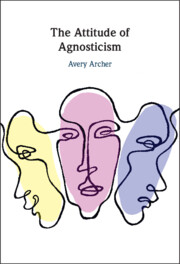17 results
Chapter 4 - The Questioning-Attitude Account of Agnosticism
-
- Book:
- The Attitude of Agnosticism
- Published online:
- 14 March 2024
- Print publication:
- 21 March 2024, pp 59-82
-
- Chapter
- Export citation
Chapter 9 - Agnosticism, Permissivism, and Peer Disagreement
-
- Book:
- The Attitude of Agnosticism
- Published online:
- 14 March 2024
- Print publication:
- 21 March 2024, pp 171-202
-
- Chapter
- Export citation
Index
-
- Book:
- The Attitude of Agnosticism
- Published online:
- 14 March 2024
- Print publication:
- 21 March 2024, pp 214-216
-
- Chapter
- Export citation
References
-
- Book:
- The Attitude of Agnosticism
- Published online:
- 14 March 2024
- Print publication:
- 21 March 2024, pp 209-213
-
- Chapter
- Export citation
Dedication
-
- Book:
- The Attitude of Agnosticism
- Published online:
- 14 March 2024
- Print publication:
- 21 March 2024, pp v-vi
-
- Chapter
- Export citation
Chapter 10 - Conclusion
-
- Book:
- The Attitude of Agnosticism
- Published online:
- 14 March 2024
- Print publication:
- 21 March 2024, pp 203-208
-
- Chapter
- Export citation
Chapter 5 - Agnosticism and the Inquiring State of Mind
-
- Book:
- The Attitude of Agnosticism
- Published online:
- 14 March 2024
- Print publication:
- 21 March 2024, pp 83-106
-
- Chapter
- Export citation
Copyright page
-
- Book:
- The Attitude of Agnosticism
- Published online:
- 14 March 2024
- Print publication:
- 21 March 2024, pp iv-iv
-
- Chapter
- Export citation
Contents
-
- Book:
- The Attitude of Agnosticism
- Published online:
- 14 March 2024
- Print publication:
- 21 March 2024, pp vii-ix
-
- Chapter
- Export citation
Chapter 7 - On the Non-existence of Practical Agnosticism
-
- Book:
- The Attitude of Agnosticism
- Published online:
- 14 March 2024
- Print publication:
- 21 March 2024, pp 132-150
-
- Chapter
- Export citation
Acknowledgements
-
- Book:
- The Attitude of Agnosticism
- Published online:
- 14 March 2024
- Print publication:
- 21 March 2024, pp x-xii
-
- Chapter
- Export citation
Chapter 1 - Introduction
-
- Book:
- The Attitude of Agnosticism
- Published online:
- 14 March 2024
- Print publication:
- 21 March 2024, pp 1-5
-
- Chapter
- Export citation
Chapter 6 - The Act-Attitude Account of Doxastic Neutrality
-
- Book:
- The Attitude of Agnosticism
- Published online:
- 14 March 2024
- Print publication:
- 21 March 2024, pp 107-131
-
- Chapter
- Export citation
Chapter 8 - Agnosticism and Pragmatic Reasons
-
- Book:
- The Attitude of Agnosticism
- Published online:
- 14 March 2024
- Print publication:
- 21 March 2024, pp 151-170
-
- Chapter
- Export citation
Chapter 2 - Criteria for a Satisfactory Account of Agnosticism
-
- Book:
- The Attitude of Agnosticism
- Published online:
- 14 March 2024
- Print publication:
- 21 March 2024, pp 6-40
-
- Chapter
- Export citation
Chapter 3 - Competing Attitudinal Accounts of Agnosticism
-
- Book:
- The Attitude of Agnosticism
- Published online:
- 14 March 2024
- Print publication:
- 21 March 2024, pp 41-58
-
- Chapter
- Export citation

The Attitude of Agnosticism
-
- Published online:
- 14 March 2024
- Print publication:
- 21 March 2024



